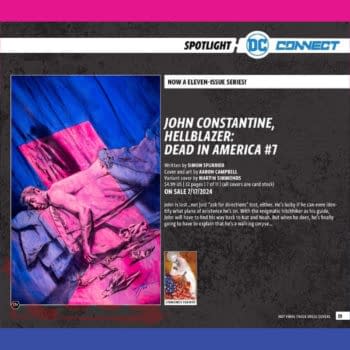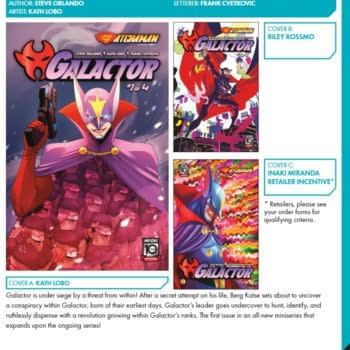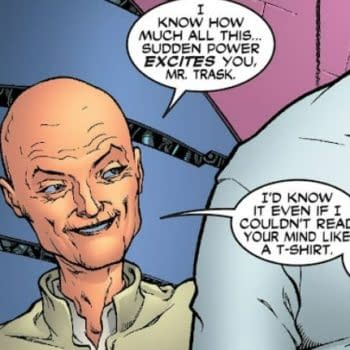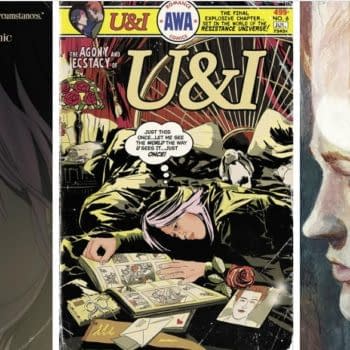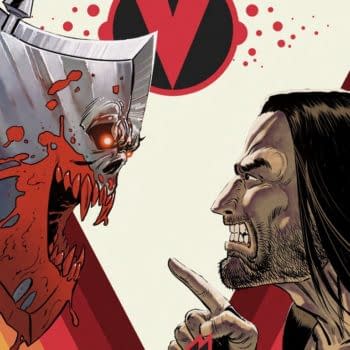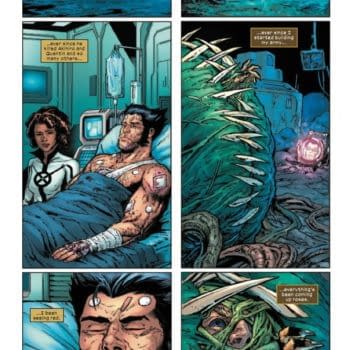Posted in: Comics, Recent Updates | Tagged: Comics, darick robertson, entertainment, kickstarter
Crowdfunding Comics Is Broken
I'm an academic. I'm trained to overanalyze. And in planning my Kickstarter, I had to take a hard look at how crowdfunding for comics works. And my conclusion is that, too often, crowdfunding for comics is broken.
The Kickstarter in question is for Martian Comics, a unique sci-fi comic that we think is very different. Kevin Thurman and I wrote it. Sergio Tarquini drew it, R.L. Campos colored it, and Colin Bell lettered it. The cover is by the immortal Darick Robertson and colored by Diego Rodriguez. We hope you'll give it a chance, and share it if you like it. Like so many comics creators on Kickstarter, we poured our hearts and souls into this, and your support means the world to us.
With that out of the way, let me explain what I think crowdfunding comics has gone awry.
In theory, crowdfunding works like this: you have a product you want to get to market, but you don't have the funds. A group of people fund you online, voting with their dollars. They get the product, which wouldn't exist otherwise, as well as the joy of knowing they helped it exist (and were on the ground floor, if it or its creators go on to other things!). The product's creators get to make the product, and everyone wins.
But comics creators don't only offer their comic. They don't merely offer it in multiple formats, like a download for $3 and a print version for $5, or both for $7. They need other rewards, so they offer posters and variant covers and sketches and merchandise of all sorts. This is all to entice you to increase your pledge, and it's easy these days to print a few dozen or a few hundred copies of all kinds of merchandise.
Now, maybe you want a poster for a comic you haven't read yet. But it's more likely you won't hang this poster on your wall, and this is just something it's nice to get as a kind of "thank you" for giving a little more. How many times have you gotten in the mail that slipcased hardcover with the signed sketch page insert, for which you pledged $60, only to realize the actual comic was only just okay? That's not surprising, really, because it probably only existed to get you to increase your pledge from, say, $40 to $60. Well, that and for the creator's own vanity.
Except that slipcased hardcover could easily have cost $30 to print and ship, not including time. So if it got you to increase your pledge form $40 to $60, and the $40 pledge was digital-only, you thought you were helping the comic by increasing your pledge. In fact, you were giving $10 less, after the added expenses of the slipcased hardcover. And because the cost of these slipcased hardcovers was already priced into the campaign's goal, in a sense everyone's paying for them, whether they got a slipcased hardcover or not.
More than likely, that slipcased hardcover was one of a dizzying array of merchandise. Once the campaign ended successfully, and the surveys were completed, the creators set about ordering all this merchandise, coordinating with multiple manufacturers. Paying for this ate a huge percentage of the money they raised. Then their dining room filled up with boxes — not just the slipcased hardcovers, but the posters and keyrings and variant covers. Then they spent what might be a month unpacking all of this, combining different objects into (potentially hundreds of) new boxes they bought, packing and labeling all these boxes, and taking them to the post office. None of this is the comics creators' area of expertise, and it takes a huge amount of time and mental energy. It's like a full-time job, and it can take weeks. Creators run late, then feel guilty about it. Inevitably, packages come back, people who pledged have to be chased down to get new addresses. Labels come off packages, some disappear in transit, and packages have be resent. This is all a huge logistical business, which we don't usually think about when we select a reward.
Now, if you really wanted this merchandise, and you're happy to own it, that's great. And if the creators really wanted it to exist, and you've basically subsidized them getting the variant covers they desperately wanted for their own comic, that's great for them. There's nothing intrinsically wrong with any reward, as long as it's really wanted and creators are willing to provide it.
But more than likely, most of this merchandise was provided because it's expected now. It's become part of how you run a comics Kickstarter. A comics Kickstarter looks weird without all this stuff. A lot of potential donors will simply reject a comics Kickstarter that doesn't play this game.
The effect seems to be that a lot of people are enticed to get rewards they probably wouldn't buy otherwise, which probably sit in drawers. This raises the cost of the Kickstarter and lessens the amount the creators can actually put towards creating. It also puts the creators in the order fulfillment and merchandising business, which they probably don't want to do and may not be the best at. Combine this with guilt, and this has even broken some creators. Yes, all these rewards might help get the campaign funded. But too often, they can turn what should be a win-win (you get the comic and the creators get to make it!) into something of a lose-lose (you get something you don't really want and the creators stop their creative production to send it to you).
Please don't get us wrong: it's immensely flattering for any comics creator that you might want any of this stuff. It's amazing, in fact. If you truly want Martian Comics tea cozies, we think you're a freaking angel. No kidding.
But a lot of us think comics are over-merchandised as it is. We're not in love with the very existence of variant covers. They're designed to get more money out of the same readership, rather than expanding that readership. Perhaps this is understandable on Kickstarter, where people are just trying to get their comic made. But we'd rather get a thousand $3 donations than three $1000 donations.
Let's get back to making comics again.
And yes, this also means sacrificing having a print edition. Mark Waid's spoken eloquently about the economics of this, but every small publisher knows it. Color comics are absurdly expensive, especially in the low quantities of indy publishers. It's not abnormal for the cost to be around $3.50 for a single copy, and that's not including shipping costs, all the time involved, or any profit at all. Now, you might say we should give Kickstarter pledges what they want, and if they're willing to pledge $10 or $15, why not offer a print copy? Unfortunately, it's not that easy. Besides the time involved, no one's going to order a dozen copies. When you print copies, you usually get increments in 100s. Also, the per-unit cost drops the more you order. So when you put in an order, you always buy extras to take to conventions and sell or give away. This makes sense. What happens when you get a print copy as a reward is that you're subsidizing a much bigger print order. Of course, this eats up huge amounts of time and money, far in excess of the cost of fulfilling your rewards. You're either in the print business or you're not. And if you are, it's a whole thing. One that's a huge drag on the publisher and a huge distraction from all the logistics of getting the next issue made.
I've no doubt that this choice of mine will be punished. But I'm convinced it's the smart move for the long-term, when I put my comic first, ahead of my own desire to hold a print version of my own comic. Should you be willing to put aside your desire to hold a print version, we can get the second issue to you a lot sooner, and the comic you hopefully like will be measurably healthier in the long term.
Of course, you should get rewards for pledging, and those rewards should feel special. But digital rewards can be just as special, and they don't suck much money or time from the comic itself. We've tried to do this with our campaign, offering scripts and black-and-white artwork. We're not planning on letting anyone except our Kickstarter pledges see this stuff, so it's truly special.
Doing this means we can ask for less from you. It means more of our time and more of your money goes into producing the comic. We put the money on the page, and we stay focused on constantly planning and revising to make the comic the absolute best comic possible.
Everything else is a distraction.
That's not to say we're not offering any merchandise. We've chosen to offer a single piece of merch: a T-shirt featuring the immortal Darick Robertson's stunning cover art, colored by Diego Rodriguez.
Like we said, there's nothing wrong with merchandise if you really want it. We might not like variant covers or posters, but there's nothing wrong with a T-shirt if it's really special. And this is something we want to exist because we want to wear it ourselves! It's beautiful, and it's printed on a black tee to make the image pop.
If you want to contribute to my comic, the Kickstarter is here.
Below is the comic's eight-page first chapter – a complete story with a Grant Morrison-esque twist ending.
But whether this particular comic inspires you or not, I encourage you to support digital-only, stripped-down Kickstarters for comics. I'd love to see a back-to-basics move, where the quality and the coolness of the comic is what's being judged, instead of how well creators play to the culture of bells and whistles.

















